Executive Summary
As June begins and the busy spring conference season comes to an end, it's time for the annual summer slowdown in the advisory business - when clients begin to travel and are harder to schedule for meetings, advisors themselves go on summer vacation with family, and there's a lot (or at least a little!) more time for relaxing and reading books.
As an avid reader myself, I know I'm always eager to hear suggestions of good books to read, and so in the spirit of sharing, I maintain a list of my top recommended books for financial advisors, and I launched my first "Summer Reading List" of recommendations back in 2013. It was so popular, I created a new Summer Reading list in 2014. And continuing the trend, I'm now excited to share my latest 2015 Summer Reading list, with suggestions on everything from practice management and "sales" skills to advisors, to the latest in Social Security, and for those who prefer a somewhat "lighter" fare, two recent books on how to teach children to be responsible with money and the science of how spending money really can make us happier.
So as we head into the summer season, I hope that you find this suggested reading list to be helpful... and please do share your own suggestions of what you're reading in the comments at the end of the article as well!
 Happy Money (Elizabeth Dunn and Michael Norton) - As the old saying goes, "money can't buy happiness", but a growing base of research finds that the reality is far more nuanced. How we spend our money actually does impact our happiness, and changing the ways we spend - both on ourselves and on others - really can improve our enjoyment and wellbeing. For instance, the research shares that we derive more long-term enjoyment by spending on experiences than buying 'stuff' (even though we think it will be the opposite, because experiences are fleeting and 'stuff'/objects last). Similarly, the research also shows that because we're so capable as humans to attenuate and adapt to situations (which can make us bored with something we might have otherwise enjoyed), that (infrequently) treating ourselves really does make something more enjoyable, as does buying something now but consuming it later (and allowing the anticipation build). Using our money to buy time - i.e., to free up time for more experiences - also drives greater happiness. And it turns out that one of the greatest ways to derive happiness from money actually is to give at least some of it away; in one global study, the fact that someone had donated to charity in the past month was as much of a happiness boost as doubling household income! So ultimately, whether you're trying to figure out how to get more enjoyment from your own money and wealth, or help clients enjoy more of their own, Happy Money is a great read to understand what the research really shows when it comes to the links between money and happiness!
Happy Money (Elizabeth Dunn and Michael Norton) - As the old saying goes, "money can't buy happiness", but a growing base of research finds that the reality is far more nuanced. How we spend our money actually does impact our happiness, and changing the ways we spend - both on ourselves and on others - really can improve our enjoyment and wellbeing. For instance, the research shares that we derive more long-term enjoyment by spending on experiences than buying 'stuff' (even though we think it will be the opposite, because experiences are fleeting and 'stuff'/objects last). Similarly, the research also shows that because we're so capable as humans to attenuate and adapt to situations (which can make us bored with something we might have otherwise enjoyed), that (infrequently) treating ourselves really does make something more enjoyable, as does buying something now but consuming it later (and allowing the anticipation build). Using our money to buy time - i.e., to free up time for more experiences - also drives greater happiness. And it turns out that one of the greatest ways to derive happiness from money actually is to give at least some of it away; in one global study, the fact that someone had donated to charity in the past month was as much of a happiness boost as doubling household income! So ultimately, whether you're trying to figure out how to get more enjoyment from your own money and wealth, or help clients enjoy more of their own, Happy Money is a great read to understand what the research really shows when it comes to the links between money and happiness!
 The Opposite Of Spoiled (Ron Lieber) - While most people can agree on the definition of a "spoiled" child (few responsibilities, lavished with attention, lots of material possessions), there's still no word in our language to describe a child who has been raised as the opposite of spoiled... despite the fact that one of the goals for virtually any parent is to raise "non-spoiled" fiscally responsible children! Lieber suggests that when you try to define the opposite of being spoiled, you end out describing the values that would be embodied in such behavior, like patience and perseverance, thrift, modesty, and generosity. Accordingly, "The Opposite Of Spoiled" explores how money can be used to teach these values to children, from how much allowance should be given to children to teach responsible spending (and how they should allocate it between spending, saving, and giving), to the ways the money conversations can be introduced to children, detailing both expert research on these topics, as well as practical tips from parents who have gone through the process. If you're a financial advisor who is a parent with young children, you will definitely find this book helpful in gaining some ideas about how to teach money lessons to your own kids; but ultimately, the book is equally helpful for any advisor, as conversations about how to teach children about money comes up with our own clients as well. In fact, many advisors may even want to give copies of "The Opposite Of Spoiled" as a gift to their own clients!
The Opposite Of Spoiled (Ron Lieber) - While most people can agree on the definition of a "spoiled" child (few responsibilities, lavished with attention, lots of material possessions), there's still no word in our language to describe a child who has been raised as the opposite of spoiled... despite the fact that one of the goals for virtually any parent is to raise "non-spoiled" fiscally responsible children! Lieber suggests that when you try to define the opposite of being spoiled, you end out describing the values that would be embodied in such behavior, like patience and perseverance, thrift, modesty, and generosity. Accordingly, "The Opposite Of Spoiled" explores how money can be used to teach these values to children, from how much allowance should be given to children to teach responsible spending (and how they should allocate it between spending, saving, and giving), to the ways the money conversations can be introduced to children, detailing both expert research on these topics, as well as practical tips from parents who have gone through the process. If you're a financial advisor who is a parent with young children, you will definitely find this book helpful in gaining some ideas about how to teach money lessons to your own kids; but ultimately, the book is equally helpful for any advisor, as conversations about how to teach children about money comes up with our own clients as well. In fact, many advisors may even want to give copies of "The Opposite Of Spoiled" as a gift to their own clients!
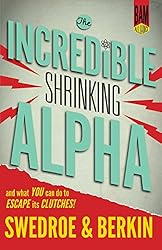 The Incredible Shrinking Alpha (Larry Swedroe & Andrew Berkin) - The basic concept of "The Incredible Shrinking Alpha" is that many of the investment strategies (and investment managers) that have historically produced "alpha" are really nothing more than owning exposure to passive risk factors. For instance, the Fama and French research on the size (small cap) and value factors explains much of the historical outperformance of Graham and Dodd and their value-investing successors; in other words, yes they did outperform in the past, but you could have replicated most of their outperformance simply by passively owning a portfolio with small-cap and value tilts. And as research continues to find more factors - now including momentum and profitability/quality - there are more and more opportunities to simply own exposure to those factors passively without using an active manager, and the amount of potential alpha (the potential to outperform beyond all those factors) shrinks further. In addition, Swedroe and Berkin also note that the increasing concentration of investment dollars in the hands of institutions means there is more and more "smart" money and less and less "dumb" money, which limits the potential for alpha, and exacerbates the so-called "Paradox of Skill". Of course, the caveat to all of this is that there's not universal agreement on what constitutes all of the "passive" factors that one is supposed to own, but the book certainly makes the case that going forward the focus may be more and more on picking the right factor exposures - a form of "smart beta"? - rather than just trying to find an active manager to pick individual securities.
The Incredible Shrinking Alpha (Larry Swedroe & Andrew Berkin) - The basic concept of "The Incredible Shrinking Alpha" is that many of the investment strategies (and investment managers) that have historically produced "alpha" are really nothing more than owning exposure to passive risk factors. For instance, the Fama and French research on the size (small cap) and value factors explains much of the historical outperformance of Graham and Dodd and their value-investing successors; in other words, yes they did outperform in the past, but you could have replicated most of their outperformance simply by passively owning a portfolio with small-cap and value tilts. And as research continues to find more factors - now including momentum and profitability/quality - there are more and more opportunities to simply own exposure to those factors passively without using an active manager, and the amount of potential alpha (the potential to outperform beyond all those factors) shrinks further. In addition, Swedroe and Berkin also note that the increasing concentration of investment dollars in the hands of institutions means there is more and more "smart" money and less and less "dumb" money, which limits the potential for alpha, and exacerbates the so-called "Paradox of Skill". Of course, the caveat to all of this is that there's not universal agreement on what constitutes all of the "passive" factors that one is supposed to own, but the book certainly makes the case that going forward the focus may be more and more on picking the right factor exposures - a form of "smart beta"? - rather than just trying to find an active manager to pick individual securities.
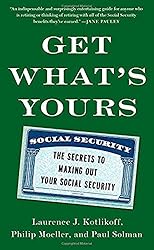 Get What's Yours: The Secrets To Maxing Out Your Social Security (Laurence Kotlikoff, Philip Moeller, & Paul Solman) - While many books are written about Social Security claiming strategies, "Get What's Yours" is unique in its depth of delving through the maze of Social Security rules. The book came about after Solman (the economics correspondent for PBS NewsHour) was interviewing Kotlikoff (an economics professor who has studied Social Security), and during the break Kotlikoff asked what Solman planned to do in claiming Social Security. Solman said that he and his wife planned to wait until age 70 to maximize their benefits, but Kotlikoff pointed out that even if both planned to wait, that one of them could file-and-suspend and the other could file a restricted application for spousal benefits, allowing them to enjoy almost $1,000/month of extra benefits for four years on top of delaying both benefits to age 70. After realizing that even as an economics correspondence for over 30 years he didn't know about the rule, Solman agreed to write the book with Kotlikoff. Notably, as the title implies, "Get What's Yours" is written primarily for consumers to navigate their own Social Security decisions, but the book is a good guide for advisors as well, highlighting not only some of the more "popular" claiming strategies like file-and-suspend, but also more esoteric strategies, along with extensive examples and hypothetical scenarios (along with some "gotchas" to avoid).
Get What's Yours: The Secrets To Maxing Out Your Social Security (Laurence Kotlikoff, Philip Moeller, & Paul Solman) - While many books are written about Social Security claiming strategies, "Get What's Yours" is unique in its depth of delving through the maze of Social Security rules. The book came about after Solman (the economics correspondent for PBS NewsHour) was interviewing Kotlikoff (an economics professor who has studied Social Security), and during the break Kotlikoff asked what Solman planned to do in claiming Social Security. Solman said that he and his wife planned to wait until age 70 to maximize their benefits, but Kotlikoff pointed out that even if both planned to wait, that one of them could file-and-suspend and the other could file a restricted application for spousal benefits, allowing them to enjoy almost $1,000/month of extra benefits for four years on top of delaying both benefits to age 70. After realizing that even as an economics correspondence for over 30 years he didn't know about the rule, Solman agreed to write the book with Kotlikoff. Notably, as the title implies, "Get What's Yours" is written primarily for consumers to navigate their own Social Security decisions, but the book is a good guide for advisors as well, highlighting not only some of the more "popular" claiming strategies like file-and-suspend, but also more esoteric strategies, along with extensive examples and hypothetical scenarios (along with some "gotchas" to avoid).
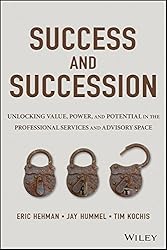 Success and Succession: Unlocking Value, Power, and Potential (Eric Hehman, Jay Hummel, & Tim Kochis, due out in fall of 2015) - While last year's "Succession Planning for Financial Advisors" by David Grau, Sr., is one of the best books written on the subject for advisors, a challenge of both the books on succession planning and the presentations typically delivered at conferences is that they're either from the perspective of the founding advisor who sold, or a third-party consultant. In this book (which is technically due out in the early fall, just after the summer ends - yours truly got an advanced copy!), Hehman and Hummel share their perspective as the "junior" planners who bought into and took over an advisory firm, and the kinds of issues that the successor must consider to execute a successful transition, from the operational transition of leadership from founder to successor, to the ways to structure ownership, and separate ownership from management. The outcome of their efforts is a book unlike anything else ever written for financial advisors - a book about succession planning, focused on how to actually execute a successful transition, with the unique wisdom that can only come from having been through the process and experienced the mistakes to learn from. For anyone considering becoming the successor of an advisory firm, "Success and Succession" is a must-read, and given some of the challenging dynamics that can occur between founders and successors, is arguably a book that should be read by any and every founder who is considering a succession plan as well!
Success and Succession: Unlocking Value, Power, and Potential (Eric Hehman, Jay Hummel, & Tim Kochis, due out in fall of 2015) - While last year's "Succession Planning for Financial Advisors" by David Grau, Sr., is one of the best books written on the subject for advisors, a challenge of both the books on succession planning and the presentations typically delivered at conferences is that they're either from the perspective of the founding advisor who sold, or a third-party consultant. In this book (which is technically due out in the early fall, just after the summer ends - yours truly got an advanced copy!), Hehman and Hummel share their perspective as the "junior" planners who bought into and took over an advisory firm, and the kinds of issues that the successor must consider to execute a successful transition, from the operational transition of leadership from founder to successor, to the ways to structure ownership, and separate ownership from management. The outcome of their efforts is a book unlike anything else ever written for financial advisors - a book about succession planning, focused on how to actually execute a successful transition, with the unique wisdom that can only come from having been through the process and experienced the mistakes to learn from. For anyone considering becoming the successor of an advisory firm, "Success and Succession" is a must-read, and given some of the challenging dynamics that can occur between founders and successors, is arguably a book that should be read by any and every founder who is considering a succession plan as well!
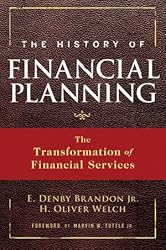 The History Of Financial Planning (Denby Brandon & Oliver Welch) - While not a "new" book (it came out almost 6 years ago), "The History of Financial Planning" is still a must-read for anyone in the financial planning profession, who wants to understand the roots of where we came from. Extensively researched back to the roots of financial planning in 1969 - when the 'movement' was first created by a onetime vacuum-cleaner salesman and a former insurance salesman turned school-supplies salesman - the book documents the original and rise of the major organizations and institutions of financial planning, from the creation of the International Association for Financial Planners (IAFP) and the College for Financial Planning in 1972 (and the first class of CFP certificants in 1973), to the "spin-off" of the CFP Board from the College in 1985, the rise of the Institute of Certified Financial Planners (ICFP), the IAFP and ICFP merger into the FPA in 2000, and more. Along the way, the book also documents many of financial planning's key milestones, from the creation to the Financial Planning Standards Board (FPSB) to grow the CFP marks around the globe, to the "One Profession, One Designation" movement, to the infamous "CFP Lite" controversy of the late 1990s. It's difficult to truly understand the landscape of financial planning as it exists today without putting it into its historical perspective, so if you've never read "The History of Financial Planning", now's the time!
The History Of Financial Planning (Denby Brandon & Oliver Welch) - While not a "new" book (it came out almost 6 years ago), "The History of Financial Planning" is still a must-read for anyone in the financial planning profession, who wants to understand the roots of where we came from. Extensively researched back to the roots of financial planning in 1969 - when the 'movement' was first created by a onetime vacuum-cleaner salesman and a former insurance salesman turned school-supplies salesman - the book documents the original and rise of the major organizations and institutions of financial planning, from the creation of the International Association for Financial Planners (IAFP) and the College for Financial Planning in 1972 (and the first class of CFP certificants in 1973), to the "spin-off" of the CFP Board from the College in 1985, the rise of the Institute of Certified Financial Planners (ICFP), the IAFP and ICFP merger into the FPA in 2000, and more. Along the way, the book also documents many of financial planning's key milestones, from the creation to the Financial Planning Standards Board (FPSB) to grow the CFP marks around the globe, to the "One Profession, One Designation" movement, to the infamous "CFP Lite" controversy of the late 1990s. It's difficult to truly understand the landscape of financial planning as it exists today without putting it into its historical perspective, so if you've never read "The History of Financial Planning", now's the time!
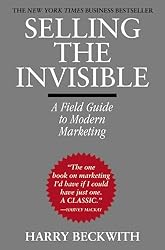 Selling The Invisible (Harry Beckwith) - First published in 1997, "Selling The Invisible" is considered a marketing classic for any service business where the ultimate goal is not to sell a physical object, but to sell an "invisible" intangible solution... which certainly includes financial planning. The challenge when considering what "invisible services" to buy from the consumer's perspective - whether it's the services of a plumber or an accountant or a financial planner - is that it's especially difficult to evaluate the expertise and quality, since you often won't really know whether someone was really an expert until after the fact when it's too late. And from the advisor's perspective, it's equally challenging to sell the invisible, when consumers - knowing how difficult it is to evaluate - often just default back to the inertia of doing nothing. Accordingly, Beckwith makes the point that because it's so difficult to prospectively evaluate a service, we default instead to evaluating the service provider instead, scrutinizing the relatively few details we have available (how the advisor dresses, the look of his/her office, the first impression of his/her website, etc.), and our relationship with that advisor. In turn, this means that making your financial planning services more compelling may require a focus on areas that most advisors don't necessarily think about, from whether the website has pictures of you and your staff, to how your staff answers the phone and greets prospective clients entering the office, to whether the advisor is clearly positioned as a differentiated expert with a specialization or niche. Ultimately, "Selling The Invisible" is not a book specific to advisors, but it does convey numerous concepts around marketing, selling, and positioning, that are extremely relevant for advisors trying to grow their business!
Selling The Invisible (Harry Beckwith) - First published in 1997, "Selling The Invisible" is considered a marketing classic for any service business where the ultimate goal is not to sell a physical object, but to sell an "invisible" intangible solution... which certainly includes financial planning. The challenge when considering what "invisible services" to buy from the consumer's perspective - whether it's the services of a plumber or an accountant or a financial planner - is that it's especially difficult to evaluate the expertise and quality, since you often won't really know whether someone was really an expert until after the fact when it's too late. And from the advisor's perspective, it's equally challenging to sell the invisible, when consumers - knowing how difficult it is to evaluate - often just default back to the inertia of doing nothing. Accordingly, Beckwith makes the point that because it's so difficult to prospectively evaluate a service, we default instead to evaluating the service provider instead, scrutinizing the relatively few details we have available (how the advisor dresses, the look of his/her office, the first impression of his/her website, etc.), and our relationship with that advisor. In turn, this means that making your financial planning services more compelling may require a focus on areas that most advisors don't necessarily think about, from whether the website has pictures of you and your staff, to how your staff answers the phone and greets prospective clients entering the office, to whether the advisor is clearly positioned as a differentiated expert with a specialization or niche. Ultimately, "Selling The Invisible" is not a book specific to advisors, but it does convey numerous concepts around marketing, selling, and positioning, that are extremely relevant for advisors trying to grow their business!
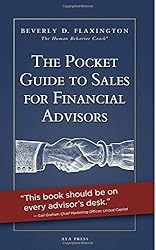 The Pocket Guide To Sales For Financial Advisors (Beverly Flaxington) - A relatively light read, this book is a good primer for those who are just getting started as financial advisors and are trying to orient themselves around how to "do" sales as a financial advisor. The early part of the book focuses primarily on marketing strategy - also helpful for those who are unfamiliar - but the real value is the motivating discussion on actual "sales" strategies in the middle. For advisors with little business development experience, it may be a new concept to realize that even if you want to help a prospective client and they want your help, it may take them a very long time to come to that conclusion (if ever) and that being able to tactfully prod someone along, give them the "next steps" they need to follow through, and then ultimately being willing to ask for their business can be crucial to actually doing business with someone (whether it's getting someone to buy your product, or pay your financial planning fees, we're all in the business of "sales" in the end!). Similarly, it's not enough to just have some marketing materials and a service that you provide; ultimately, you must craft an actual sales process - what you will talk about, and when, to guide a prospective client through - if you want to actually do business and sell your services. The Pocket Guide To Sales also includes some discussion of building relationships with Centers of Influence, "Storytelling" techniques, and more. Experienced advisors may find it to be a nice refresher and pick up an idea or two (and it is a relatively short and "light" read), but the book is probably best suited to newer advisors who are just trying to get up to speed in the first place.
The Pocket Guide To Sales For Financial Advisors (Beverly Flaxington) - A relatively light read, this book is a good primer for those who are just getting started as financial advisors and are trying to orient themselves around how to "do" sales as a financial advisor. The early part of the book focuses primarily on marketing strategy - also helpful for those who are unfamiliar - but the real value is the motivating discussion on actual "sales" strategies in the middle. For advisors with little business development experience, it may be a new concept to realize that even if you want to help a prospective client and they want your help, it may take them a very long time to come to that conclusion (if ever) and that being able to tactfully prod someone along, give them the "next steps" they need to follow through, and then ultimately being willing to ask for their business can be crucial to actually doing business with someone (whether it's getting someone to buy your product, or pay your financial planning fees, we're all in the business of "sales" in the end!). Similarly, it's not enough to just have some marketing materials and a service that you provide; ultimately, you must craft an actual sales process - what you will talk about, and when, to guide a prospective client through - if you want to actually do business and sell your services. The Pocket Guide To Sales also includes some discussion of building relationships with Centers of Influence, "Storytelling" techniques, and more. Experienced advisors may find it to be a nice refresher and pick up an idea or two (and it is a relatively short and "light" read), but the book is probably best suited to newer advisors who are just trying to get up to speed in the first place.
 Scenario Selling: Technology And The Future Of Professional Selling (Patrick Sullivan & David Lazenby) - While the title dubs it a book on "selling", this book is really about the future role of any/all financial planners giving advice in an increasingly technology-driven world where more and more information is readily available at our fingertips. The key distinction that Sullivan and Lazenby make is that problems to solve can be divided up based on the amount of information and the amount of experience necessary to solve them. Technology is especially good at solving problems of information, but not the more complex problems that require experience as well, and especially not the "hyper-complex" problems that require both knowledge/information and experience to come up with solutions. The latter remains the domain of the professional advisor and expert. However, the authors also make the point that as the complexity of the problem increases, so too does the role of technology and the role of the advisor; merely complicated problems require an expert that uses technology to analyze and 'solve' the problem, but hyper-complex problems - like most of the ones clients face in the real world - require the advisor to work collaboratively with clients, using technology together to simulate scenarios and evaluate which path is best in an uncertain world. Given this dynamic, what starts out as a book about the future of "selling" really morphs into one about how financial planners must engage their clients with technology tools to deliver real-time collaborative financial planning as a means to remain relevant in an increasingly digital world.
Scenario Selling: Technology And The Future Of Professional Selling (Patrick Sullivan & David Lazenby) - While the title dubs it a book on "selling", this book is really about the future role of any/all financial planners giving advice in an increasingly technology-driven world where more and more information is readily available at our fingertips. The key distinction that Sullivan and Lazenby make is that problems to solve can be divided up based on the amount of information and the amount of experience necessary to solve them. Technology is especially good at solving problems of information, but not the more complex problems that require experience as well, and especially not the "hyper-complex" problems that require both knowledge/information and experience to come up with solutions. The latter remains the domain of the professional advisor and expert. However, the authors also make the point that as the complexity of the problem increases, so too does the role of technology and the role of the advisor; merely complicated problems require an expert that uses technology to analyze and 'solve' the problem, but hyper-complex problems - like most of the ones clients face in the real world - require the advisor to work collaboratively with clients, using technology together to simulate scenarios and evaluate which path is best in an uncertain world. Given this dynamic, what starts out as a book about the future of "selling" really morphs into one about how financial planners must engage their clients with technology tools to deliver real-time collaborative financial planning as a means to remain relevant in an increasingly digital world.
 Quiet: The Power Of Introverts (Susan Cain) - The past century has witnessed the rise of the "Extroverted Ideal", a world where we rate those who are the most talkative and outgoing as the being smarter and more interesting, and the fastest-talking as the most competent and likable. Yet in the context of history, our modern obsession with the "Cult of Personality" is really the exception to the rule; in the past, a "Culture of Character" favored those who were serious, disciplined, and honorable instead, and in many non-US cultures, these traits are still considered the ideal. In fact, Cain makes the case in her book that despite our modern world's obsession with extroversion, it's actually introverts who drive the most creativity and innovation. Similarly, introverts also tend towards fewer and deeper one-to-one relationships - which is notable, because it suggests that being an introvert may be an especially good fit for being a financial planner! Ultimately, Cain's book provides a deeply researched perspective on what the introversion/extroversion dynamic is really all about - in a manner that may give extroverts better perspective on how to effectively work with introverts (whether as colleagues or clients), and can be a rallying cry for introverts to realize or be reminded of how much they have to offer the world, too. As a strong introvert myself (yes it's true!), this book resonated deeply with me!
Quiet: The Power Of Introverts (Susan Cain) - The past century has witnessed the rise of the "Extroverted Ideal", a world where we rate those who are the most talkative and outgoing as the being smarter and more interesting, and the fastest-talking as the most competent and likable. Yet in the context of history, our modern obsession with the "Cult of Personality" is really the exception to the rule; in the past, a "Culture of Character" favored those who were serious, disciplined, and honorable instead, and in many non-US cultures, these traits are still considered the ideal. In fact, Cain makes the case in her book that despite our modern world's obsession with extroversion, it's actually introverts who drive the most creativity and innovation. Similarly, introverts also tend towards fewer and deeper one-to-one relationships - which is notable, because it suggests that being an introvert may be an especially good fit for being a financial planner! Ultimately, Cain's book provides a deeply researched perspective on what the introversion/extroversion dynamic is really all about - in a manner that may give extroverts better perspective on how to effectively work with introverts (whether as colleagues or clients), and can be a rallying cry for introverts to realize or be reminded of how much they have to offer the world, too. As a strong introvert myself (yes it's true!), this book resonated deeply with me!
If you're still looking for more, be sure to check out our 2014 summer reading list, and even the 2013 summer reading list for financial advisors as well! After all, if you haven't read it yet, it's still new to you! 🙂
So what do you think? Will you be reading any of these books over the summer? Do you have any suggestions of your own that you're willing to share? Please speak up in the comments below!




